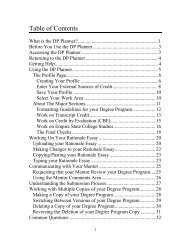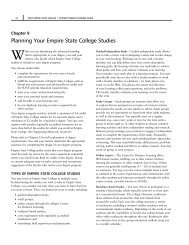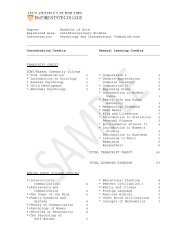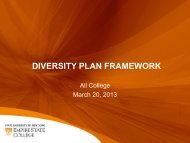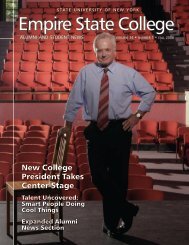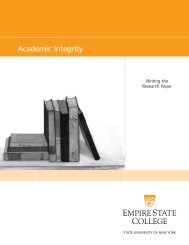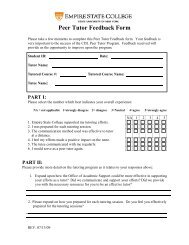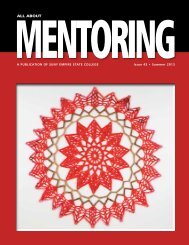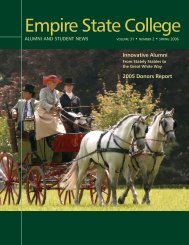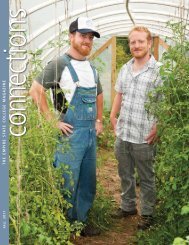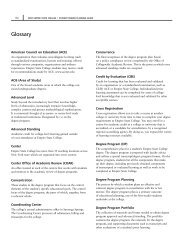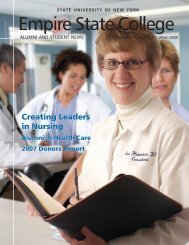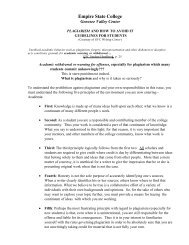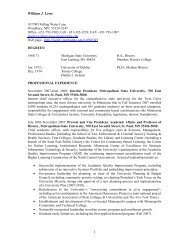Academic Plan 2011-2015 (PDF 524kB) - SUNY Empire State College
Academic Plan 2011-2015 (PDF 524kB) - SUNY Empire State College
Academic Plan 2011-2015 (PDF 524kB) - SUNY Empire State College
You also want an ePaper? Increase the reach of your titles
YUMPU automatically turns print PDFs into web optimized ePapers that Google loves.
34 <strong>SUNY</strong> <strong>Empire</strong> <strong>State</strong> <strong>College</strong>: <strong>Academic</strong> <strong>Plan</strong> <strong>2011</strong> - <strong>2015</strong>Theme C: Faculty <strong>Plan</strong>ning and DevelopmentIntroductionThe practice of mentoring serves as both a historical hallmark and a philosophical touchstone ofthe college. While faculty do play diverse roles across the college as mentors, in relation to specificprograms and modes of study, the ability to plan for a faculty body that both engages effectively andexpertly in the practice of mentoring and brings the academic expertise to build and sustain excellencein academic programs is critical. Thus, this section of the academic plan focuses on the need forcollective planning to shape the faculty body, and the ways the college needs to address the ongoingsupport and professional development of faculty mentors.Goal C1: Ensure that Our Faculty Have the Content and Practice ExpertiseNecessary to Serve the Current and Future Needs of StudentsThe first section of the academic plan proposes academic themes for future program developmentand criteria for deciding which programs will be developed. The second section focuses on theenvironments within which our faculty mentor, teach and learn. The purpose of this section is to setout the questions and processes necessary to ensure that the college will have the faculty expertiserequired to support current as well as future learners in their academic endeavors.Objective C1.1: Ascertain the current state of the facultyFaculty expertise at <strong>Empire</strong> <strong>State</strong> <strong>College</strong> is complex; while faculty at all institutions must have masteryof subject matter and engage in scholarly activity, faculty at <strong>Empire</strong> <strong>State</strong> <strong>College</strong> have a broadermandate. Our faculty must engage in scholarly activity, but also develop expertise in a number ofareas: working with adult learners in the practice of mentoring and in the design of undergraduatedegree programs; and developing knowledge of the specific program(s) in which they work, and inthe evaluation of experiential learning. Finally, the faculty must have expertise in a range of modes oflearning that utilize various forms of educational technology.First, it makes sense to consider the faculty of the college as the faculty of the whole college. Morespecifically, if we are to plan for the academic future of the college, we will need to understand thecurrent composition of our faculty, and what areas of expertise or interest they hold.Faculty expertiseWhat subject matter expertise do we have in terms of teaching and learning? On the onehand, our present area of study (AOS) may be too broad to describe faculty knowledge areasaccurately; on the other hand, many faculty are working in multidisciplinary fields which crossAOS boundaries. More specifically, we need to document the areas where faculty are engaged inscholarship. As an example, one theme mentioned earlier in this document is Adult Learning andEducation. We should be able to identify easily who among the faculty is engaged in scholarlywork in this area. We need to identify our areas of distinction in scholarship.



